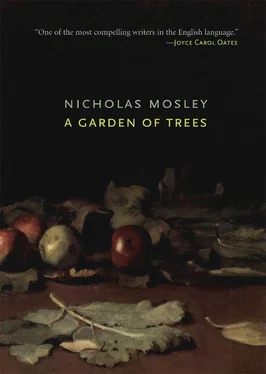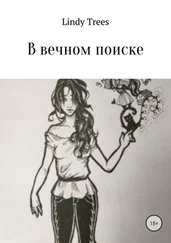“But Annabelle,” Peter said, “you cannot expect the hare not to run when the dogs are after it.”
“Then it is you who are the dogs,” Annabelle said, “and it is you who have taken away the heart of the hare.”
“Is it?” Peter said. “Is it I who have asked it to be a hare?”
“It is no good blaming anyone except yourself,” Annabelle said.
“You said once that we can never know about ourselves,” I said.
“No, but yourself is the only person that you can blame.”
Peter looked sad. “I cannot blame myself for the pride and seduction and prostitution of others,” he said.
“Perhaps not, but you cannot blame the others either.”
“I don’t,” he said. “You know I don’t.”
“You are such a terrifying moralist,” Marius said.
We stood up, preparing to go. The people at the next table looked down at our feet. Annabelle wore no stockings, Peter had a hole in the leg of his trousers, and Marius wore enormous brown shoes that were curiously flat like kippers. The men looked pleased. As we went down in the lift Peter said, “Why not ask Alice round to-morrow?” and Marius said, “Alice has had a rather heartbreaking life, you know.” Peter said, “Why?” and Marius said, “Well, you must wait till you see her,” and Annabelle and I stood with our arms close in to our sides, not touching. In the street Peter said, “Shall we expect you to-morrow?” and I said, “Yes,” and as I walked away she did not look at me and it was as if there was some string between us that was breaking.
6
Alice had got herself well dressed up. Tall, thin, with a coat like a cape hanging in folds, her smooth drooping face very pale above it, in the taxi she talked incessantly in her lilting emphatic way. “How exciting,” she said. “I never go out, you see. Are you anxious then? Why are you so silent? I promise I won’t disgrace you in any way.”
We were going round for drinks. The taxi rattled like a cocktail shaker. Drinks were the meeting-ground for social England. Tea in the villages and gin in the cities. Hands would have nothing to do without a cup or glass to fiddle with, mouths would lose their power without a liquid to drown the silences. A façade had to be erected: for Alice and the people with Alice meetings would be unbearable without a barrier. For Peter and Annabelle on their own it would not be necessary, but even they could not deal with social England without a façade.
In the room at Grosvenor Square the drinks were there, ready, on a silver tray by the window. Alice sat opposite them, talking, her face soft and pallid in the reflected light. Only her eyes were hard — brittle and metallic like the fragile flash of glass. She was making an impression, putting her act over, getting power. Our entrance had been a success. She did it so cleverly, there was such artistry behind it, she had already turned the ground into a battlefield. I was sad that the battle had begun so quickly, almost automatically, as Peter had predicted. I wondered why Alice had wanted to come. She fought efficiently, with the power that she knew, the power of her bright steely eyes like the polished sights of a machine-gun. Gentleness had gone, and quietness had gone: she hated silences. Silences to her were uncanny. So she carried her eyes all gleaming and bright and she quite steadily shot people down with them. Her voice was only an accompaniment, like the noise of bullets. It was her eyes that fired, hitting, and her words were the echo.
“So you have come to live in England?” she was saying: “And your father is still abroad? I should have thought that it was better, surely, to be abroad nowadays than in England.”
“I agree,” Peter said.
“Then why don’t you go? It would be easy for you, wouldn’t it?”
“It’s Marius’s fault,” Peter said. “He wants to stay.”
“But good heavens, you don’t have to do what Marius wants, do you?”
“Oh yes, I think we do.”
“Why? How dreadful to be dependent on Marius!”
“Yes it’s terribly sinister isn’t it?” Peter said.
Alice turned away. I wondered if it was possible that Peter might defeat her, if defeat was what he wanted. He was nervous, being under fire, and after all it is difficult not to fight back against machine-guns. But I did not particularly want him to win.
“Of course,” she said, “you are terribly lucky to be living here. It really is delightful. I should not mind London so much myself if I could live in a place like this.”
“Do you mind London?” Peter said.
“Doesn’t everyone? No servants, no fun, no food. . ”
“Surely there is plenty of food?”
“Of course, to you, who can eat in a restaurant, who can get anything. . ”
“What I meant was to you,” Peter said.
“To me? Of course to me. I didn’t think you’d understand.”
“I try,” Peter said.
Annabelle was in the background, Marius had not yet come in, and Peter was doing his fighting with a cautious indignation that was still quite pleasant, but which I was afraid at any moment might turn to alarm. Alice rattled on with unceasing attack.
“You know,” she was saying, “really anything can happen to you anywhere nowadays, the other day I was in a taxi, it is too dreadful, and we stopped at a stoplight, and a man got in beside me, just got in, a perfect stranger, just sitting there beside me without even saying a word.”
“Yes?” Peter said. “Yes?”
“He really might have done anything, he might have cut my throat; it is terrible to think that one is at the mercy of people like that, that they are quite on top of you, everywhere.”
“And what did he do?” Peter said.
“I told you, he came and sat in my taxi.”
“He did?”
“Yes. And then people get drunk the whole time, and they come round knocking at your door, or ring you up, and you have to spend hours with them, literally hours, trying to get them away, and you have no peace any more, that is the terrible thing, you have no peace.”
“But the man in the taxi. . ”
“But peace. . ” Peter and I both started talking at once, and then stopped, and Alice darted in quickly.
“It is like living in a workhouse,” she said.
“A workhouse!” Peter said, as if shocked.
“But surely these people. . ” I began again.
“Of whom are you talking?” Peter said to Alice.
“Of everyone,” Alice said.
“You make me almost contented,” Peter said. I saw Annabelle look up at him quickly.
“. . it is because they can’t stand peace,” I went on.
“Contented?” Alice said, ignoring me. “How can you say that, don’t you feel it, don’t you know what I mean, they have power over you, absolute power, in a million ways, and you can’t get away from them, all the fuss, and the dreariness, it is on top of you like a fog, don’t you know what I mean?”
“No,” Peter said.
“Well, good heavens, what sort of idea can you have of life?”
“I still don’t know of whom you are talking,” Peter said. “You personally — why does it strike you as a workhouse?”
“It is what one is deprived of,” Alice said.
“And what is that?”
“Why — fun, easiness, easiness, yes, nothing is ever easy anymore, people are too frightened to be easy: they are starved, really starved, of all the things that make life bearable.”
“It is not ease and fun that make life bearable,” Peter said. “As indeed most people know who at the moment have too much of it.”
“Too much of it?”
“Yes, and the ones who haven’t at least have more than they ever had before, and they are the majority. The ones who have less are the minority and them I don’t know about, except that I shouldn’t think that the fun and ease that they had once ever did them any good, so that they are missing the point when they complain of the lack of it.”
Читать дальше












